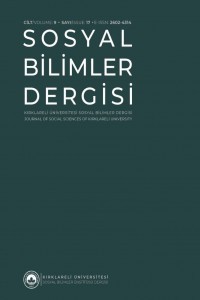Öz
Kaynakça
- Abdouli, M., & Hammami, S. (2017). The impact of FDI inflows and environmental quality on economic growth: an empirical study for the MENA countries. Journal of the Knowledge Economy, 8(1), 254-278.
- Adams, S. (2009). Foreign direct investment, domestic investment, and economic growth in Sub-Saharan Africa. Journal of policy modeling, 31(6), 939-949.
- Agénor, P. R., & Montiel, P. J. (2008). Development macroeconomics. Princeton University Press.
- Almfraji, M. A., & Almsafir, M. K. (2014). Foreign direct investment and economic growth literature review from 1994 to 2012. Procedia-Social and Behavioral Sciences, 129, 206-213.
- Amadou, A. (2011). The effect of foreign capital on domestic investment in Togo. International journal of economics and finance, 3(5), 223-226.
- Asongu, S. A., & Odhiambo, N. M. (2020). Foreign direct investment, information technology and economic growth dynamics in Sub-Saharan Africa. Telecommunications Policy, 44(1), 101838.
- Ayanwale, A. B. (2007). FDI and economic growth: Evidence from Nigeria.
- Azman-Saini, W. N. W., Law, S. H., & Ahmad, A. H. (2010). FDI and economic growth: New evidence on the role of financial markets. Economics letters, 107(2), 211-213.
- Balcilar, M., Ozdemir, Z. A., & Shahbaz, M. (2019). On the time‐varying links between oil and gold: New insights from the rolling and recursive rolling approaches. International Journal of Finance & Economics, 24(3), 1047-1065.
- Belloumi, M. (2014). The relationship between trade, FDI and economic growth in Tunisia: An application of the autoregressive distributed lag model. Economic systems, 38(2), 269-287.
- Berthélemy, J. C., & Demurger, S. (2000). Foreign direct investment and economic growth: theory and application to China. Review of development economics, 4(2), 140-155.
Öz
The path to achieving economic expansion as well as the ultimate economic development is the greatest macroeconomic goal sought after by all global economies. Traditionally, these resources are classified as labour and capital. Therefore, we focus on the capital factor and its impact on economic advancement. This study classifies the capital resource capital into two categories namely domestic and foreign capital and to compare their respective influence on economic expansion. The results show that domestic capital is more influential in promoting the cause of economic expansion whereas external debt demonstrates the serious level of threat to the course of economic expansion in Nigeria. Thus, this study recommends the need for the authority concern to look inward in resolving it economic challenges through domestic mobilization of resources . Sourcing for external capital should strictly take the form of FDI and foreign aids to augment the domestic capital for economic reasons with the view to expand the productive capacity of the economy.
Anahtar Kelimeler
Kaynakça
- Abdouli, M., & Hammami, S. (2017). The impact of FDI inflows and environmental quality on economic growth: an empirical study for the MENA countries. Journal of the Knowledge Economy, 8(1), 254-278.
- Adams, S. (2009). Foreign direct investment, domestic investment, and economic growth in Sub-Saharan Africa. Journal of policy modeling, 31(6), 939-949.
- Agénor, P. R., & Montiel, P. J. (2008). Development macroeconomics. Princeton University Press.
- Almfraji, M. A., & Almsafir, M. K. (2014). Foreign direct investment and economic growth literature review from 1994 to 2012. Procedia-Social and Behavioral Sciences, 129, 206-213.
- Amadou, A. (2011). The effect of foreign capital on domestic investment in Togo. International journal of economics and finance, 3(5), 223-226.
- Asongu, S. A., & Odhiambo, N. M. (2020). Foreign direct investment, information technology and economic growth dynamics in Sub-Saharan Africa. Telecommunications Policy, 44(1), 101838.
- Ayanwale, A. B. (2007). FDI and economic growth: Evidence from Nigeria.
- Azman-Saini, W. N. W., Law, S. H., & Ahmad, A. H. (2010). FDI and economic growth: New evidence on the role of financial markets. Economics letters, 107(2), 211-213.
- Balcilar, M., Ozdemir, Z. A., & Shahbaz, M. (2019). On the time‐varying links between oil and gold: New insights from the rolling and recursive rolling approaches. International Journal of Finance & Economics, 24(3), 1047-1065.
- Belloumi, M. (2014). The relationship between trade, FDI and economic growth in Tunisia: An application of the autoregressive distributed lag model. Economic systems, 38(2), 269-287.
- Berthélemy, J. C., & Demurger, S. (2000). Foreign direct investment and economic growth: theory and application to China. Review of development economics, 4(2), 140-155.
Ayrıntılar
| Birincil Dil | Türkçe |
|---|---|
| Bölüm | Araştırma Makaleleri |
| Yazarlar | |
| Yayımlanma Tarihi | 30 Haziran 2021 |
| Yayımlandığı Sayı | Yıl 2021 Cilt: 5 Sayı: 1 |

